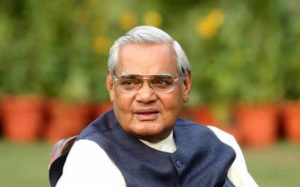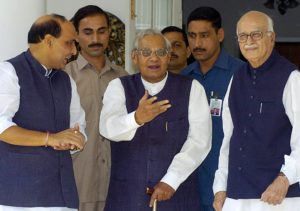Atal Bihari Vajpayee: The man who legitimised the BJP, is no more
Atal Bihari Vajpayee, 93, who breathed his last on August 16, served twice as India’s prime minister. He not only founded the Bharatiya Janata Party (BJP), but also helped it gain wider political legitimacy.
Former Prime Minister Atal Bihari Vajpayee was admitted to the All India Institute of Medical Sciences (AIIMS) on June 11, 2018 after he was diagnosed with urinary tract infection and chest congestion. He breathed his last on August 16 at 05:05pm, AIIMS said in a statement.
The nonagenarian BJP leader was the oldest living ex-prime minister of the country. Vajpayee’s health was a cause of concern for the BJP. He had undergone knee replacement surgery at the Breach Candy Hospital in Mumbai in 2001 and suffered a stroke in 2009 that impaired his speech. He was also a patient of diabetes and dementia.
Tenure as PM
His first stint as prime minister in 1996 lasted 13 days, from May 16 to 28. The second tenure ran for 13 months, from March 19, 1998. However, he learnt from failures and went on to preside over a National Democratic Alliance (NDA) that took office on October 13, 1999 and completed a five-year term. His was the first multi-party coalition in India to do so and he was the only non-Congress prime minister to complete his term.
He stunned the world by making India a declared nuclear state in 1998 and then almost went to war with arch-rival Pakistan, before making peace in the most dramatic fashion.
He initiated it by starting a bus service between New Delhi and Lahore. Its inaugural run in February 1999 took Vajpayee to Pakistan. The service was suspended after the 2001 terror attack on the Indian Parliament that nearly led to a war between India and Pakistan.
The freeze between the two nuclear rivals at the border ended in 2003 when Vajpayee, while in Kashmir, extended a ‘hand of friendship’ to Pakistan. This culminated in a historic summit in January 2004 with then president Pervez Musharraf in Islamabad, a remarkable U-turn after the failed summit in Agra of 2001.
A moderate political thinker
One of the shrewdest politicians of the country, Vajpayee successfully projected himself as a moderate, if not a liberal. The BJP’s ideological mentor, Rashtriya Swayemsevak Sangh (RSS), mainstream political parties and the media were swayed by his charisma as he deftly played his communal undertones while carefully and cautiously advancing his political career.
Vajpayee had spent months in prison when Indira Gandhi imposed Emergency Rule in June, 1975. When the Janata Party took office in 1977, dethroning the Congress nationally for the first time, he became the foreign minister.
When frenzied Hindu mobs razed the Babri mosque in 1992, his was a lone voice in the saffron brigade. As the hardliners celebrated, Vajpayee remained full of personal remorse and called it the “worst miscalculation”.
Though immersed in Hindutva he was not willing to bow down to it. This probably won him admirers from across the political spectrum.
Despite his grand ‘secular’ statements in the Parliament—Vajpayee had often taken brief excursions into the hard-line camp. “In 1983, Vajpayee made an incendiary speech during the Assam elections in which the presence of ‘Bangladeshi foreigners’ in the state was a big issue. Even the BJP had disowned Vajpayee’s speech, which possibly inspired the massacre of over 2000 men and women— mostly Muslims—in Nellie in Assam. Vajpayee told the Assamese masses that had such ‘intruders’ come into Punjab,they would have been cut into pieces. “The riot happened within hours,” NP Ullekh wrote in his book—The Untold Vajpayee: Politician and Paradox—quoting veteran communist leader, Indrajit Gupta and a lead opinion piece from The Hindu.
In the wake of the inflammable incendiary speech that led to the massacre, Vajpayee had set the bar high for his fellow Sanghis when it came to inciting communal hatred. No wonder, Modi continued as chief minister after the Gujarat riots in 2002.
One is left to wonder whether Vajpayee’s ‘controlled displeasure’ of asking Modi to follow his ‘Raj Dharma’ was merely aimed at public consumption, given the manner in which the senior statesman, as a schoolboy, had composed a short ballad that takes pride in his ‘Hindu’ identity; something that is now sung in the RSS camps.
Throughout his life, Vajpayee was caring towards his benefactors and ruthless with his detractors.
The many faces of Vajpayee
“Vajpayee remained ambitious to the core, worsting rivals in intra-party intrigue. All through his career, he remained a Janus-faced schemer to his enemies. He decimated the opposition without confrontation”, Ullekh observed writing about Vajpayee’s love and hate relation in the Bharatiya Jan Sangh, and later, in the BJP.
His highest utility for BJP was winning new friends at a time when the party was seen as a political untouchable. His benevolent presence attracted newer allies into the BJP fold. He used his extraordinary powers of persuasion and goodwill to win friends, to prove that even the BJP could have partners and come to power.
Yet, Vajpayee during his tenure as a prime minister had feared a coup from none other than his old-time friend and deputy prime minister, Lal Krishna Advani!
While the current prime minister is criticised for being ruthless with his critics and detractors, Vajpayee did not spare anyone either, whether in his youth or at the far end of his career. In fact, KN Govindacharya, the celebrated Chanakya of BJP, had to beat a hasty retreat from active politics for stating that Vajpayee was a mask. Similarly, Venkaiah Naidu had to withdraw his comparison of Vajpayee and his deputy—the former as a man of progress (VikasPurush) and the latter as a man of steel (LohPurush).
Vajpayee’s popularity matched that of Indira Gandhi – a woman he admired for her guts even as he hated her politics. He became the country’s best known national leader after Indira Gandhi and her father Jawaharlal Nehru. Since 2014, Narendra Modi has stolen the show.
To sum it up, he was known for negotiating multiple paradoxes—from his militant nationalism and his secret family life, to his stint as a communist and his indulgence in food!











